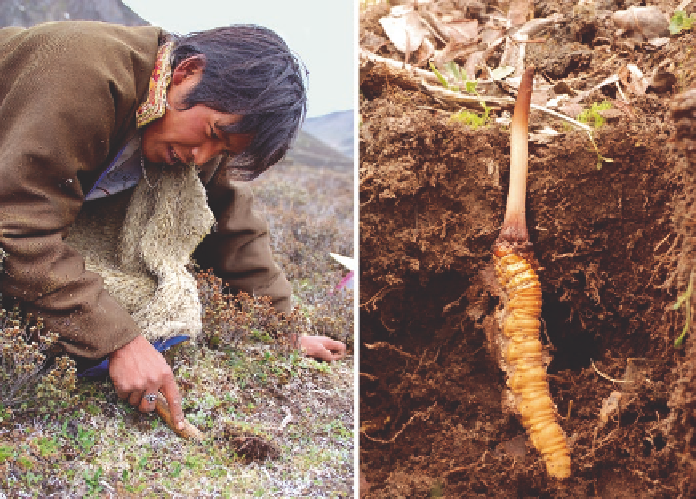Geoscience Reference
In-Depth Information
Duped immune systems
.
Cordyceps
, a type of fungi that infects insects, forms many active sub-
stances and has long been used in traditional Chinese medicine. For example,
Cordyceps sinensis
is thought to cure cancer. It also seems to have aphrodisiac properties and is known as the Viagra
of the Himalayas. Collecting the fungal fruit bodies has become a source of subsistence for many
Tibetans. When the fungi reach the Chinese market, they are worth more than their weight in gold
You need sharp eyes to spot the club-shaped fruiting body protruding from the ground,
revealing the presence of an infected larva. The
Cordyceps sinensis
in the picture is related to the
fungus that provides us with the drug cyclosporin, which facilitates organ transplants by inhibit-
ing the immune system's ability to reject foreign tissue. The cyclosporin fungus
Tylopocladium
inflatum
grows parasitically on beetles
sample, a fungus known as
Tolypocladium inflatum
formed a substance that
proved effective at inhibiting the growth of other fungi. The effect was too limited
for practical use, but luckily the scientists persisted with studying it and found that
it inhibited immune response when administered to mice injected with red blood
cells from a sheep. This was the discovery of cyclosporine, which stops the body
from rejecting foreign tissue. It marked a breakthrough for transplant surgery and
the drug is today enabling people round the globe to lead normal lives with trans-
planted kidneys and cystic fibrosis sufferers to survive with new lungs. All because
a Swiss drugs company sent its staff on holiday with plastic sample bags.
Tolypocladium
is a strange organism with an unusually high tolerance of lead.
It is rare in most woodland soil but in the village of Kastad in Norway, where the
ground is naturally polluted by lead, it is the commonest fungus.
Tolypocladium
is related to
Cordyceps
, a genus of fungi that attacks insects and that is also espe-
cially tolerant of heavy metals. Perhaps the pharmaceuticals industry should spend
more time studying areas suffering from heavy-metal contamination in its quest
for new drugs.

Search WWH ::

Custom Search